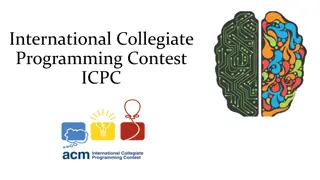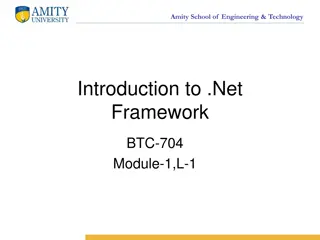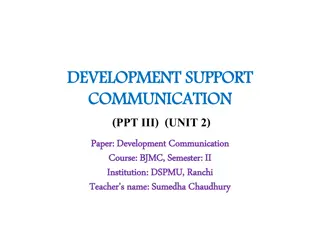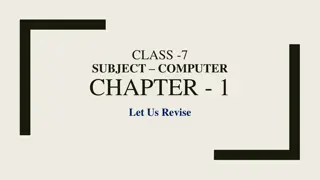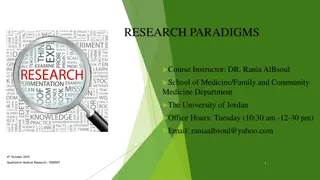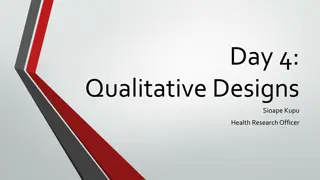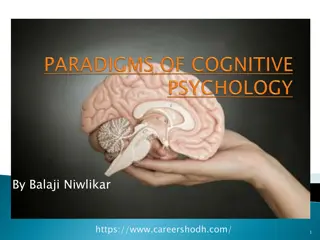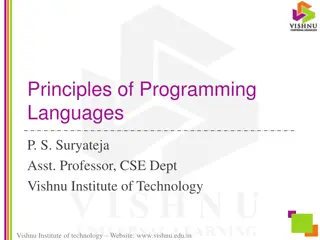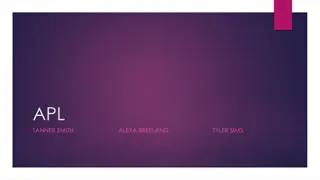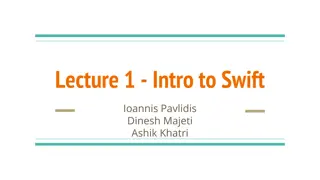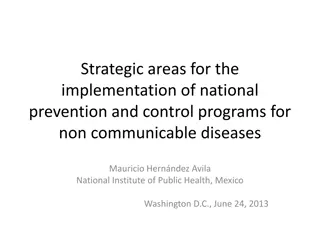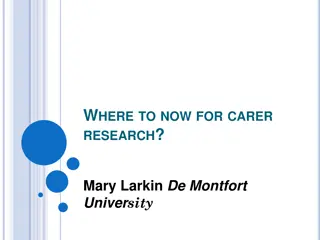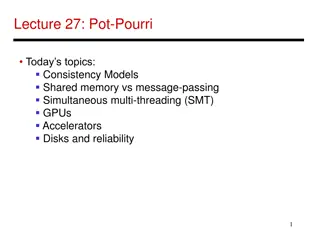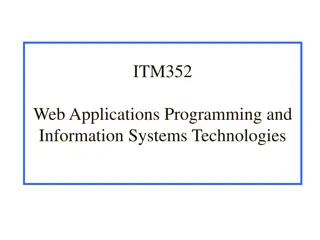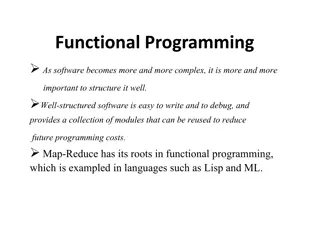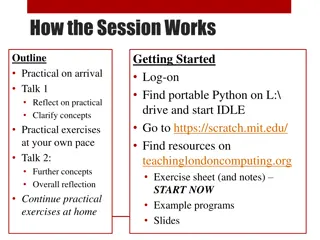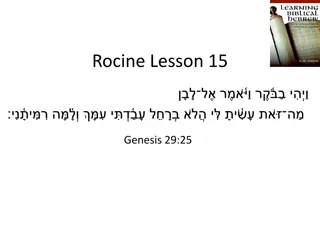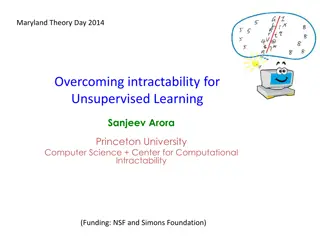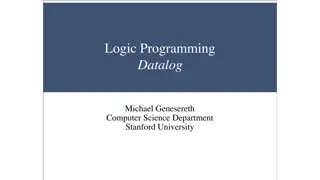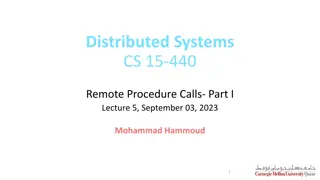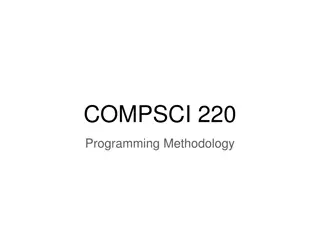Functional Programming
Functional programming, a paradigm that emphasizes declarative programming, pure functions, and limited side effects. Explore the benefits and characteristics of functional programming languages.
0 views • 20 slides
Programming in C: Overview and Constants Explanation
Programming in C is a fundamental introductory guide to the C programming language. It covers the basics of C, including its development history, character set, constants, and rules for constructing constants like integer and real constants. Dr. M. A. JAMAL MOHAMED YASEEN ZUBEIR, an Assistant Profes
4 views • 33 slides
International Collegiate Programming Contest (ICPC) Overview and Rules
The International Collegiate Programming Contest (ICPC) is a prestigious global competition in competitive programming supported by major tech companies like Google and Facebook. Participants tackle logical and mathematical problems by developing efficient algorithms and implementing them in various
5 views • 17 slides
Decision Analysis and Operations Research in Management
This content delves into Management Decision Analysis and Operations Research techniques such as Linear Programming, Integer Linear Programming, Dynamic Programming, Nonlinear Programming, and Network Programming. It covers the phases of an Operations Research study, mathematical modeling for decisi
0 views • 36 slides
Introduction to Amity School of Engineering & Technology
Amity School of Engineering & Technology offers courses in .NET Framework, Windows GUI development, C/C++ programming, Visual Basic, and Java/J2EE programming. The curriculum covers topics such as Win32 API, MFC, object-oriented programming, and web development. Students learn to develop application
1 views • 14 slides
Evolution of Development Communication Paradigms and Alternative Paradigm
Development Communication explores the stages of creating a plan, implementing strategies, and ownership paradigms in development projects. Emphasis is on participatory approaches, community empowerment, and inverting top-down processes. The concept of Alternative Paradigm emerges to counter the ali
2 views • 6 slides
Module 2: PSEA and Safe Programming Training of Trainers (ToT) by CRS HRD
This Module 2 focuses on PSEA and Safe Programming, covering key sessions on understanding safe programming, identifying protection and SEA risks, and mitigating risks. It emphasizes the importance of safe programming in increasing safety, dignity, and access, with staff playing a crucial role. Part
3 views • 19 slides
Computer Programming: Basics and Beyond
In this chapter, we delve into the fundamental concepts of computer programming. We explore the definition of a program, the role of programming languages, types of programming languages, and generations of programming languages. Additionally, an assignment is provided to reinforce the key learnings
0 views • 25 slides
Research Paradigms in Qualitative Medical Research
Delve into the world of research paradigms in qualitative medical research with a focus on the key differences between objective and subjective research, the meaning of research paradigms, components of research paradigms, types of research paradigms, and how paradigms guide the selection of researc
1 views • 42 slides
Qualitative vs. Quantitative Approaches in Health Research
Exploring the different methodologies, paradigms, and methods used in health research, this content highlights the distinction between qualitative and quantitative designs. It covers research questions, aims, objectives, hypotheses, and various quantitative approaches such as experimental and observ
1 views • 28 slides
Paradigms of Cognitive Psychology
Cognitive psychology, a branch of psychology, delves into mental processes like thinking, perceiving, remembering, and learning. This field views individuals as information processors, with paradigms guiding research methodologies. Key approaches include Information Processing, Connectionist, Evolut
0 views • 18 slides
Object-Oriented Programming (OOP) in Python
Python is a versatile programming language that supports various programming approaches. Object-Oriented Programming (OOP) is a popular method in Python where objects are created to solve programming problems. OOP in Python focuses on creating reusable code, following the principle of DRY (Don't Rep
2 views • 35 slides
Formal Semantics of Programming Languages: From Lambda Calculus to Separation Logic
Explore the foundational concepts of formal semantics in programming languages, covering Lambda Calculus, Untyped and Simply-typed languages, Imperative languages, Operational and Hoare logics, as well as Separation logic. Delve into syntax, reduction rules, typing rules, and operational semantics i
8 views • 14 slides
Principles of Programming Languages at Vishnu Institute of Technology
Introduction to Principles of Programming Languages course including prerequisites, objectives, outcomes, and syllabus at Vishnu Institute of Technology. The course covers key concepts, popular programming paradigms and languages, practical knowledge in lexical analysis and parsing, as well as writi
1 views • 43 slides
Introduction to Computers and C++ Programming Lecture 1 - Overview and Basics
This lecture covers the fundamental concepts in computer systems and programming using C++. Topics include the main components of a computer, bytes and addresses in memory, computer systems hardware and software, understanding programs, programming languages, compilers, preparing and running C++ pro
2 views • 21 slides
APL - A Functional Language with Array Paradigms
APL, named after the book "A Programming Language Paradigms," is a functional language with a focus on array manipulation. Developed in the 1960s by Kenneth E. Iverson, it has had a significant impact on the development of spreadsheets and computer math packages. APL operates with chains of monadic
0 views • 11 slides
Web Application Development and Programming CTE Program Overview
Viera High School offers a comprehensive CTE program in Web Application Development and Programming, taught by Mr. Dohmen. Students learn popular programming languages like Python, SQL, JavaScript, Java, C#, and C. The courses cover web programming, JavaScripting, and PHP programming, providing cert
3 views • 7 slides
Innovations in Social Work Research: Emerging Topics and Paradigms
Explore the latest trends in social work research at the 2016 Joint World Conference on Social Work, Education, and Social Development. Discover topics such as global change, indigenous concerns, and migration issues. Delve into research paradigms, methodologies, and challenges, including the impact
0 views • 8 slides
Introduction to Programming with RobotC in Robotics Education
Programming in robotics involves giving specific directions to a robot using software like RobotC. This introduction covers the basics of programming, software organization, and how to get started with RobotC through creating flow charts and programming tasks. Learn about setting up RobotC, creating
1 views • 8 slides
Introduction to Programming and Computer Instructions
Programming is the process of creating instructions for computers to follow and accomplish tasks. It involves turning human language instructions into detailed binary machine language. Before learning programming, individuals may have different levels of experience, ranging from no experience to pro
0 views • 16 slides
Introduction to Swift Programming Language
Swift is a modern programming language known for its evolution and development since 2010. It is a general-purpose, compiled language that supports both object-oriented and functional programming paradigms. Key features include constants, variables, operators, strings, optionals, and control flows l
0 views • 19 slides
Implementing Strategic Areas for Non-Communicable Disease Prevention
Implementation of national prevention and control programs for non-communicable diseases is crucial for sustainable healthcare systems. Collaborating with multidisciplinary groups and shifting advocacy paradigms towards human rights and social determinants of health are essential. A transformation i
1 views • 20 slides
Development of Attosecond Theory for Nobel Prize through Verilog Programming
Attosecond generation is a crucial technique for creating attosecond pulses by manipulating radiation waves. This research paper focuses on developing the Attosecond generation equation through Verilog programming and validating it using test programming techniques. The interface between equations,
2 views • 15 slides
Carer Research Trends in the UK: A Critical Analysis
Research conducted at De Montfort University explores the evolution of carer research paradigms in the UK since 1995, aiming to critique the relationship between research/theory and our understanding of carers. Through multi-stage reviews and analysis, the study delves into key dimensions of carer r
0 views • 26 slides
Memory Consistency Models and Communication Paradigms in Computer Systems
Memory consistency models define the ordering of writes and reads in computer systems. Coherence ensures write propagation and serialization, while consistency models guide programmers in writing correct programs. Shared-memory and message-passing are two communication paradigms with different appro
0 views • 31 slides
CS252 Systems Programming Course Overview
This course overview covers topics such as C programming review, Unix basics, Unix systems programming, and grading details. The course includes labs on C/C++ programming, Unix shell scripting, and writing your own shell. Communication is emphasized through Piazza for questions/answers and Blackboar
0 views • 41 slides
Introduction to Programming Languages and Functional Programming with OCaml
Welcome to Lecture 1 of CSEP505 on Programming Languages focusing on OCaml and functional programming. Professor Dan Grossman introduces the course, discusses the importance of studying programming languages, and shares insights on course mechanics and content. Topics include staff introductions, co
1 views • 84 slides
ITM352 and Its Role in MIS
Welcome to ITM352, a course focusing on acquiring basic programming skills in a business context. This course emphasizes hands-on experience in developing relevant software applications, addressing real technology problems, and fostering rapid self-learning of IS/IT technologies. Misconceptions arou
0 views • 36 slides
Functional Programming Paradigm
Functional programming emphasizes well-structured software that is easy to write and debug, with reusable modules to reduce future programming costs. It introduces higher-order functions and first-class function values, fostering declarative programming for tasks like symbolic data manipulation and
0 views • 21 slides
Essential Principles of Teaching Programming Languages
Foundational concepts in programming form the core of computing. This encompasses understanding programming fundamentals, teaching language aspects effectively, statistical programming for data analysis, and guiding students unfamiliar with programming environments towards grasping the logic and sim
0 views • 23 slides
Top Ten All-Time Stupid Quotes
Explore a collection of historical quotes demonstrating misguided predictions and beliefs, from dismissing the need for computers to doubting the significance of inventions like the telephone and moon landing. Reflect on the impact of self-paradigms and paradigms of others as discussed in the text,
0 views • 12 slides
Computer Programming Principles
Dive into the world of computer programming, covering high-level and machine languages, compilers, interpreters, writing programs, top-down design, and the array of programming languages available. Understand the essentials of building code to control computers, the diversity of programming language
0 views • 23 slides
Transitioning from Scratch to Python: A Practical Approach for Learning Textual Programming
Explore the transition from visual programming in Scratch to textual programming in Python using Turtle Graphics. Engage in practical exercises, clarify key concepts, and reflect on the challenges and progress in learning core programming concepts. Utilize resources from TeachingLondon Computing to
0 views • 21 slides
Graphics Scene Structures and Rendering Techniques
This content delves into the world of computer graphics, focusing on scene graphs, immediate mode graphics, OpenGL objects, imperative and object-oriented programming models, and Java implementation. It explains the storage and manipulation of graphic scenes, drawing techniques, and different progra
0 views • 21 slides
Hebrew Verb Forms: Qal Qatal and Piel Qatal Paradigms
Explore the rules and nuances of using definite articles with prepositions, verb forms, and verb charts in Hebrew. Learn how to identify and read the Qal Qatal and Piel Qatal paradigms, and understand the significance of prepositions with the definite article. Dive into verb charts for Qatal and dec
0 views • 25 slides
Unsupervised Learning Paradigms and Challenges in Theory
Explore the realm of unsupervised learning as discussed in the Maryland Theory Day 2014 event. Overcoming intractability for unsupervised learning, the distinction between supervised and unsupervised learning, main paradigms, NP-hardness obstacles, and examples like the inverse moment problem are co
0 views • 38 slides
CS 288-102 Intensive Programming in Linux Spring 2017 Course Details
Learn Linux programming, C language proficiency, Bash scripting, and more in this intensive course taught by Instructor C.F. Yurkoski. The course covers programming in Linux environment, command line interface, C language, client/server programming, and essential programming concepts like pointers,
0 views • 31 slides
Unraveling the Complexities of Hex Game Encoding Paradigms
Hex, a strategic two-player game invented by John Nash and Piet Hein, poses intriguing challenges for mathematicians and computer scientists. This article delves into different paradigms for encoding Hex game rules, exploring the performance of each. From basic observations to advanced approaches li
0 views • 20 slides
Distributed Systems: Remote Procedure Calls and Communication Paradigms
Explore the fundamentals of distributed systems, focusing on remote procedure calls, communication paradigms, and middleware layers. Learn how entities communicate in distributed systems, classification of communication paradigms, and the role of middleware in facilitating communication between appl
0 views • 28 slides
Functional Programming Concepts for COMPSCI 220 Programming Methodology
In this tutorial, we explore functional programming concepts in the context of COMPSCI 220 Programming Methodology. We delve into writing functions using `reduce` and discuss examples and implementations of various functions like sum, product, and string length calculation. We also analyze the diffe
1 views • 47 slides


